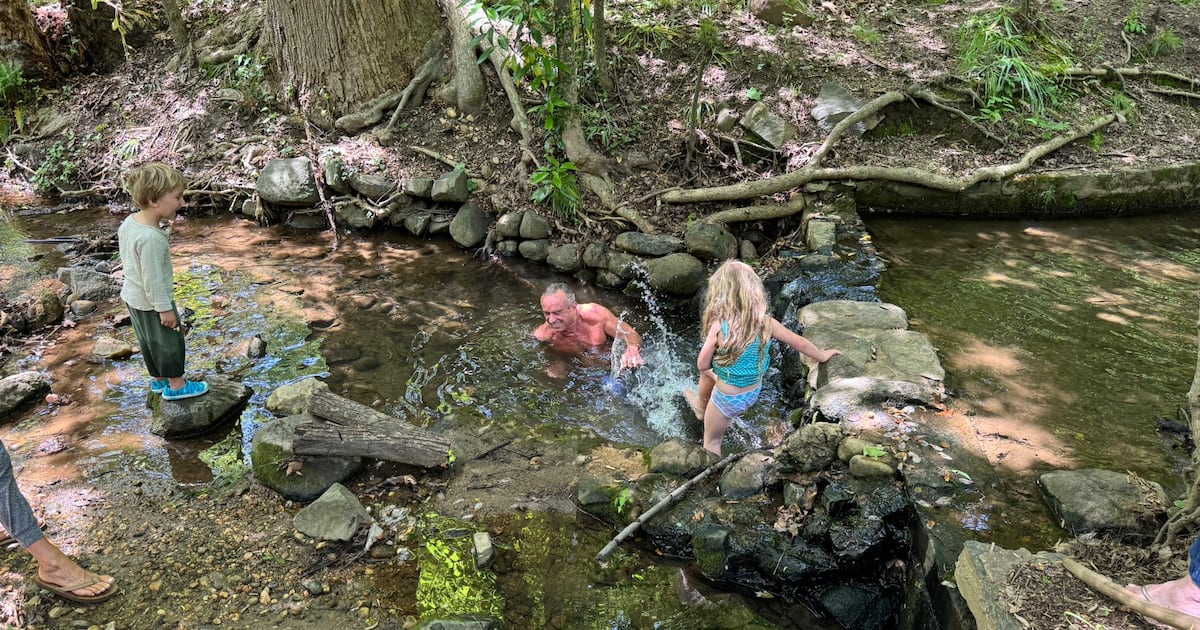RFK Jr. Sparks Concern After Swimming in Potentially Contaminated Creek with Grandchildren

Robert F. Kennedy Jr., a prominent figure in the upcoming US presidential race, has drawn criticism and raised eyebrows after recounting a weekend incident where he swam in a creek he claims was contaminated with pesticides. The story, shared during a weekend event, involved Kennedy and his grandchildren enjoying the waterway, despite his acknowledged awareness of potential health risks.
Kennedy described the creek as being “up s—t creek,” a colloquialism signifying a difficult or precarious situation. However, his decision to swim in it with his grandchildren has triggered a wave of concern and debate, particularly given his well-known stance against certain environmental regulations and his focus on perceived dangers related to vaccines and chemicals.
“I swam in this creek with my grandkids,” Kennedy reportedly stated. “I’ve been swimming in it for 50 years. It’s got Roundup running through it, and I’m still here.” This statement has been met with skepticism and criticism from health experts and concerned citizens alike. Roundup, a widely used herbicide containing glyphosate, has been linked to potential health risks, including cancer, although these links are still being debated and investigated.
The incident highlights a stark contrast between Kennedy’s public advocacy for environmental caution and his personal actions. Critics argue that his behavior undermines his credibility and sends a confusing message to the public, especially regarding the importance of protecting oneself from potentially harmful substances.
Health Concerns and Expert Reactions
Medical professionals have cautioned against dismissing the potential hazards of swimming in contaminated water. Exposure to pesticides and herbicides can lead to a range of health problems, including skin irritation, respiratory issues, and long-term systemic effects. The severity of the impact depends on the concentration of the contaminants, the duration of exposure, and individual sensitivities.
“While anecdotal evidence of surviving exposure doesn't negate the potential risks,” said Dr. Emily Carter, an environmental health specialist, “repeated or prolonged exposure to even low levels of pesticides can have cumulative effects. It's crucial to prioritize safety and avoid contact with potentially contaminated water sources, especially for vulnerable populations like children.”
Political Implications
As a presidential candidate, Kennedy’s actions are being scrutinized under a particularly intense lens. The incident has provided ammunition for his political opponents, who are questioning his judgment and consistency. Supporters, however, argue that Kennedy’s willingness to challenge conventional wisdom and highlight perceived environmental threats is a strength, not a weakness.
The situation underscores the complexities of environmental policy and the challenges of balancing personal freedom with public health concerns. It also serves as a reminder of the importance of informed decision-making and the need for robust regulations to protect communities from environmental hazards.
The controversy surrounding Kennedy’s swim is likely to persist as the election campaign progresses, further fueling debates about environmental regulations, public health, and the role of personal responsibility.






